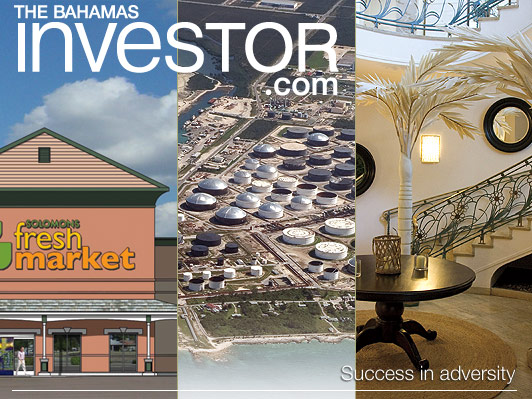| Published: Date: Updated: Author: |
The Bahamas Investor Magazine January 19, 2012 January 19, 2012 Tosheena Robinson-Blair |
The very same week that Jason Kinsale launched Phase One of his 43-acre upscale residential development project on New Providence, called The Balmoral, Lehmann Brothers investment bank collapsed, heralding the beginning of a global recession.
“I’ll never forget it,” says Kinsale. “The international investor got scared immediately.”
However, for the Bahamian investor it took about a year for the ramifications of the financial meltdown to to be felt. The delay helped keep the multi-million-dollar development alive. “The Bahamian buyer kept buying, accounting for 90 per cent of our sales in Phase One,” Kinsale recalls.
“What really saved us, from the financial perspective, is a rule of thumb for my partner and I. If you can’t buy the land in cash do not buy it, because you don’t want to get overly leveraged,” says Kinsale. “If you do, you have to start making a lot of decisions based on finances instead of what’s really the right thing to do for the long-term viability of the project.”
Situated on Sanford Drive in the western district of New Providence, The Balmoral is an exclusive residential community comprising 70 single family lots, 240 townhome/condominium units, two pools, a club house, restaurant, gym, tennis courts and a children’s playground. Its central location–minutes away from the airport, downtown and Cable Beach–is a key selling point, along with the development’s design concept of a network of cul-de-sacs, which maximizes privacy and keeps through traffic to a minimum.
“We follow the four ‘ps’ of marketing:?product, price, place and promotion,”?Kinsale explains. “In this economy you really need five Ps, the fifth one being persistence. The buyer is so sensitive and skittish that everything has to line up.”
The principal owners of The Balmoral are Kinsale and Aristo Investment Ltd. Combined they have international real estate experience in Europe, Canada, and the US, as well as locally. In 2007, the partners completed the Hampton Ridge development on New Providence, selling all 28 condos in 11 days despite only spending $1,000 on marketing. “To achieve the same level of sales in this environment today, I had to spend $100,000 on marketing,” highlights Kinsale. “It’s something you have to be relentless on.”
Kinsale, a Bahamian who grew up in Canada, is busy making final preparations for a trip to Toronto where he will formulate an aggressive marketing plan for Canadian and British buyers.
“What we’ve seen over the last year is that Bahamians have become far more [economically] conscious and now foreigners are buying. Fifty per cent of our buyers are foreign in Phase Two and Three, which is a dramatic increase from 10 per cent in Phase One,” he says. “Foreigners, especially from Canada, are coming in with cash. We’ve been able to capitalize on the Canadian market. We’re seeing some Panamanians buy as well. The direct flights [from Panama City] have helped. We are seeing a little bit more interest from Europeans too.”
Kinsale says The Balmoral does not take its success for granted. “I kind of equate it to being in the ring with Mike Tyson,” he says. “The punches do not stop coming. You just have to keep getting up and coming up with new ways to approach things, new products, new promotions, and make sure the people who bought from you are happy.”
Displaying resilience
Clark C Smith, president and chief operating officer of Buckeye Partners, LP, which owns the Bahamas Oil Refining Company International Ltd (BORCO) in Grand Bahama, espouses a similar philosophy when it comes to running a big business during economically perilous times. “At Buckeye, we always work to modernize our company. We come in every day looking for ways to improve our operations and make our company and our employees more successful,”?he says. “We have an incentive-based performance system to reward people that create value for the company. We’ve seen a lot of strong team-oriented results.”
A publicly traded partnership on the New York Stock Exchange (NYSE:BPL), Buckeye Partners owns and operates one of the largest independent liquid petroleum products pipeline systems in the US in terms of volumes delivered, with over 6,000 miles of pipeline.
Buckeye also owns more than 100 liquid petroleum products terminals with a 64-million barrel storage capacity. It operates approximately 3,400 miles of pipeline under agreements with major oil and chemical companies, in addition to owning a natural gas storage facility in Northern California. Buckeye also markets liquid petroleum products in certain regions served by its pipeline and terminal operations.
Its flagship marine terminal in The Bahamas is one of the largest oil and petroleum products storage facilities in the world, serving the international markets as a premier global logistics hub.
Smith says his company’s most important asset is its people. “That sounds like a cliché, but look at how we have built the company. Organic growth capital investments, mergers and acquisitions, and the empowerment of a very talented Buckeye organization have been the key drivers behind our success.
“Everybody at Buckeye has an equal role on the Buckeye team. The roles are different, but one is just as important as the other,” continues Smith. “We execute as efficiently as any company in the industry and we spend a lot of time working together on safety, planning and business strategy.”
The oil refining industry began experiencing leaner times back in 2007, after years of recording strong profits. The weaker performance was a result of recession-minded US drivers using less gasoline, while global demand for diesel also slowed. “We started to see the effects of the rapid rise in oil prices, which were pushing up gasoline prices. As gasoline prices went up we found out demand is elastic and the demand started to drop,” says Smith, who has been in the energy business for over 30 years. “We saw that early on in the big downturn of 2008. In seeing that, we began to develop strategies around how we were going to operate our business in an environment where it was going to be a lower economic growth than anticipated.”
Buckeye believed oil prices would come back down and they did, which normalized the demand. However, the company realized that America’s demand for gasoline was under pressure. People are driving more fuel efficient vehicles. They get more miles to a gallon and biofuels are being injected into the fuels, which reduces the amount transported. Consequently, Buckeye started to focus on improving productivity and moving more products on the pipeline system for less cost.
“We knew that we needed to get larger; achieve more economies of scale. So, we made a number of acquisitions,” says Smith. One of those acquisitions was the purchase of BORCO for $1.7 billion. A premier marine storage facility with a world-wide customer base, BORCO complemented Buckeye’s fast-growing terminalling and storage business.
Located in Grand Bahama, about 105 miles from the Florida coast, no other regional commercial storage terminal enjoys BORCO’s proximity to the US market and supply centres, as well as its scale and comprehensive service offerings. The BORCO terminal is comprised of a fully integrated terminalling business and offers customers storage, berthing, heating, transshipment, blending, treating, bunkering, and other ancillary services.
Over time, Buckeye’s chief operating officer believes they can double the original size of BORCO’s 21-million barrel capacity.
“Combined with the BORCO acquisition, we’ve invested more than $2 billion over the last 24 months, buying mainly terminals, but in some cases additional pipeline assets. That provides us with a broader platform to spread our operating costs,” Smith explains. “We’ve become more efficient through a best practices approach, a commitment to continuous improvement, enlarging our assets base and looking for efficiencies across the different regions.
“In terms of being resilient we tightened our belts. We went through and looked for ways to get more efficient. We cut some costs and tried to get our business model to where we can survive the tough times. I think we have positioned ourselves well to do that going forward.”
Buckling down
Making tough decisions and focusing on what the company does best is exactly how AML Foods Ltd (formerly Abaco Markets Ltd) turned its operations around, says the company’s chief executive officer and president Gavin Watchorn.
A publicly traded firm, listed on the Bahamas International Stock Exchange (BISX), AML operates a mix of five retail and club stores that offer a wide range of consumer products from food items to garden supplies. Additionally, AML holds the Domino’s Pizza franchise, which consists of 11 pizza locations in Nassau and Freeport.
Originally a family business, which commenced operations in the 1970s, Abaco Markets became a public company in 1989. From 1998 to 2001 the company made a number of acquisitions. Not all worked out. “The company accrued a lot of debt to finance the acquisitions and the expected benefits and synergies did not accrue as anticipated for a number of reasons,”?confirms Watchorn, an Irish chartered accountant.
The downturn in the world and Bahamian economies in 2001, exacerbated the company’s problem and Abaco Markets found itself in financial trouble. “There was a lot of debt. A lot of operations were not profitable or successful,” says Watchorn. From 2002 to 2006, under Watchorn’s predecessor, David Thurlow, the company began to turn things around by paying back and reducing debt through asset sales.
When Watchorn assumed the position of CEO in 2006, the remaining stages of the company’s restructuring took place, as the company divested its Abaco and Turks & Caicos operations, began to reinvest in its businesses and addressed operational and buying issues. In the fourth quarter of 2006, Abaco Markets recorded its first quarterly profit since 2002. It has been profitable ever since.
In 2009, the company changed its name, heralding a new era in growth and development for AML Foods. “We made a lot of very tough decisions and we shrunk the company down to core businesses that we felt had a future under us,” says Watchorn. “It was somewhat of a survival strategy. We focused on what we felt had the best medium and long-term potential for the company.”
Over the last two years two new Domino’s Pizza locations were opened–one in Coral Harbour, the other in South Beach. The company’s size and its diverse interest has helped to keep it afloat. “During difficult times in our food distribution division, our Domino’s business was actually doing quite well and that helped balance us,”?Watchorn explains. “It helped not only from a profitability standpoint, but being a large group, we can move management, cash resources and assets around as needed.”
Recently, the company launched a new store and format in the $4.5-million Solomon’s Fresh Market. The modern 38,000 sq ft grocery store is the anchor tenant for New Providence Development Co’s new shopping centre in the west of the island. “We have successfully manoeuvered our company out of challenging times. We haven’t jumped at every opportunity that’s been provided to us. Some of the best deals you do are the ones you don’t do,” says Watchorn. “I believe we’ve been very patient in laying the proper foundation to begin to grow this company again.”
At press time, AML expected to finish 2012 with 700-750 employees and close to $115 million in sales. For Watchorn, any business remaining profitable over the last couple of years is a success in its own right and yet he wants more for AML.
“Remaining profitable is a short-term success. We continuously strive not only to be the best in The Bahamas, but also to match the standards of the best in the industries we operate in. When we do that, we believe we will fulfill the potential we see in our company. So, are we pleased that we are profitable? Yes, but we are not satisfied. I don’t think you should ever be satisfied. As a businessman, you’ve always got to strive to improve yourself. When you begin to settle, you begin to go backwards.”










